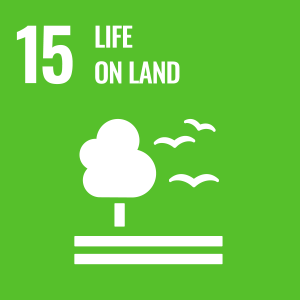 In this lesson, students will comprehensively understand SDG #15: Life on Land, including its key targets and significance. They will learn the importance of sustainable practices to protect and restore biodiversity, exploring how economic activities like agribusiness drive deforestation and its broader impacts.
In this lesson, students will comprehensively understand SDG #15: Life on Land, including its key targets and significance. They will learn the importance of sustainable practices to protect and restore biodiversity, exploring how economic activities like agribusiness drive deforestation and its broader impacts.
Students will examine the link between biodiversity loss and human health, understanding the interconnectedness of planetary and human health. They will discover how biotechnology and regenerative farming can combat climate change and restore ecosystems. Through critical thinking and reflection, students will identify resonant targets, propose land restoration steps, and develop a personal connection to the material. Working in small groups, they will enhance collaboration and communication skills, create a social media campaign to raise awareness, and engage in student-driven assessments. Finally, they will research local and global efforts in restoring forests and ecosystems, linking classroom learning to real-world actions, equipping them with knowledge and skills for environmental sustainability.
Attribution and License
Attribution
This Open Educational Resource, Cultivating Global Competence through the United Nations Sustainable Development Goals, was developed by Ryan Hauck, Julianna Patterson, Emma Hansen, Riya Kalra and Global Classroom, World Affairs Council – Seattle.
Graphics:
- Cover image by Julianna Patterson from Canva.
- Sustainable Development Goals images copyright United Nations. All rights reserved. Used pursuant to fair use.
License

Except where otherwise noted, Cultivating Global Competence through the United Nations Sustainable Development Goals, by World Affairs Council of Seattle, is available under a Creative Commons Attribution-NonCommercial License. All logos and trademarks are property of their respective owners. Sections used under fair use doctrine (17 U.S.C. § 107) are marked.
This resource may contain links to websites operated by third parties. These links are provided for your convenience only and do not constitute or imply any endorsement or monitoring by the World Affairs Council. Please confirm the license status of any third-party resources and understand their terms of use before reusing them.
 In this lesson, students will comprehensively understand SDG #15: Life on Land, including its key targets and significance. They will learn the importance of sustainable practices to protect and restore biodiversity, exploring how economic activities like agribusiness drive deforestation and its broader impacts.
In this lesson, students will comprehensively understand SDG #15: Life on Land, including its key targets and significance. They will learn the importance of sustainable practices to protect and restore biodiversity, exploring how economic activities like agribusiness drive deforestation and its broader impacts.